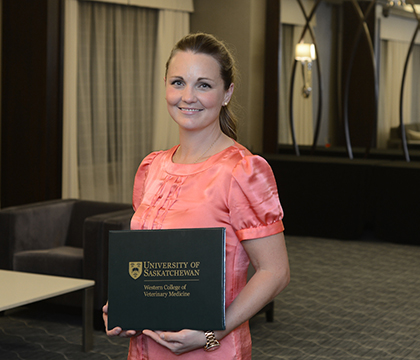
Award assists feline-focused student
Most people travel to tropical islands for some relaxation — but Michelle Lange is not like most people.
By Jeanette NeufeldWhile vacationing on the Caribbean island of St. Maarten in 2005, Lange noticed an overpopulation of stray and feral cats and dogs. She connected with local rescue groups to help out, and after that, Lange was hooked. For the next five years, she turned her family's annual vacation into an educational experience that included her husband and two teenage children, now 15 and 16.
The family would bring bags and suitcases full of supplies each time they visited the island – often skimping on clothes in favour of food and medication.
"We came up with some interesting ways to sneak in 50-pound bags of cat food onto the resort to feed the colonies of feral cats on the property," she says.
While there, Lange also visited pet owners alongside local animal welfare groups to help educate owners about the benefits of sterilization and veterinary care.
Back in Canada, she raised money and corporate pharmaceutical support to help with some of the financial difficulties facing the island's unfunded pet rescue groups, which also have to contend with the lack of an official animal shelter on the island.
Lange is now a fourth-year veterinary student at the Western College of Veterinary Medicine (WCVM). She's also the first recipient of the Lexie Adamson Award that recognizes the commitment of veterinary students who are working to help the plight of sheltered, abused and rescued animals — particularly in feline medicine.
Donor Janet Adamson created the $2,000 annual award in memory of her cat Lexie.
"I'm so appreciative of the donor for her commitment to feline medicine and wanting to make a real difference in the lives of cats that need it the most. In shelters cats are overrepresented by far, and the return-to-owner rate is very low compared to dogs. I'd like to see that change," says Lange.
Lange, who is passionate about shelter medicine, says the award will allow her to continue building on the work she began before entering veterinary school. Her work in St. Maarten is only a portion of her dedicated efforts to help the welfare of cats.
As an SPCA board member in Grande Prairie, Alta., she spearheaded a program to house and care for animals belonging to domestic abuse victims who couldn't take their pets with them to women's shelters. She also developed a public fundraising program that has contributed close to $130,000 toward the SPCA and to equine therapy programs for disabled children.
Not content with just helping out on the administrative side, Lange also volunteered more than 800 hours at the SPCA pet shelter assisting with animal care.
"I wanted to be on the front lines to see how things really work to help give me a better understanding of the unique challenges a shelter and its staff deal with on a daily basis," she says.
While in school Lange worked at the WCVM Veterinary Medical Centre caring for hyperthyroid cats undergoing radioactive iodine treatments. She is also actively involved with Street Cat Rescue and plans to continue her work with the organization after she completes her degree.
Lange has just as many feline-focused objectives after graduation. Her long-term goal is to become a board-certified feline practitioner who works in shelter medicine.
She plans to stay in Saskatchewan and become involved with remote clinics in northern communities, providing veterinary services as well as information for animal owners. Ideally Lange wants to create better access to veterinary care for those living in isolated areas — especially La Ronge and surrounding communities. She also wants to explore ways to increase animal health education and veterinary care for low-income families and rescue organizations across the province, and help to decrease and control the feral cat population locally.
One day – once she's working and no longer paying tuition – Lange also hopes to return to St. Maarten to do locum veterinary work and help stabilize and care for the island's feral cat population along with providing support to the island's animal shelter.
